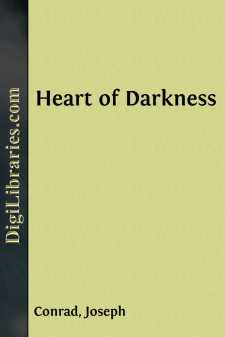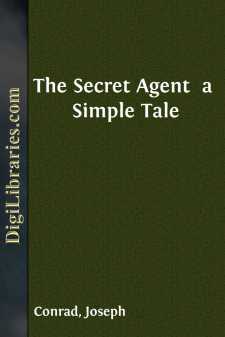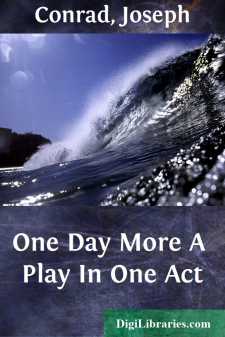Categories
- Antiques & Collectibles 13
- Architecture 36
- Art 48
- Bibles 22
- Biography & Autobiography 813
- Body, Mind & Spirit 138
- Business & Economics 28
- Children's Books 12
- Children's Fiction 9
- Computers 4
- Cooking 94
- Crafts & Hobbies 4
- Drama 346
- Education 46
- Family & Relationships 57
- Fiction 11821
- Games 19
- Gardening 17
- Health & Fitness 34
- History 1377
- House & Home 1
- Humor 147
- Juvenile Fiction 1873
- Juvenile Nonfiction 202
- Language Arts & Disciplines 88
- Law 16
- Literary Collections 686
- Literary Criticism 179
- Mathematics 13
- Medical 41
- Music 40
- Nature 179
- Non-Classifiable 1768
- Performing Arts 7
- Periodicals 1453
- Philosophy 64
- Photography 2
- Poetry 896
- Political Science 203
- Psychology 42
- Reference 154
- Religion 508
- Science 126
- Self-Help 81
- Social Science 81
- Sports & Recreation 34
- Study Aids 3
- Technology & Engineering 59
- Transportation 23
- Travel 463
- True Crime 29
Joseph Conrad
Joseph Conrad, born Józef Teodor Konrad Korzeniowski in 1857 in Poland, was a prominent British novelist known for his rich narrative style and profound exploration of the human psyche. His most famous works, such as "Heart of Darkness" and "Lord Jim," delve into themes of colonialism, morality, and existentialism. Despite English being his third language, Conrad's mastery of the language and innovative literary techniques have cemented his legacy as a central figure in modern literature.
Author's Books:
Sort by:
by:
Joseph Conrad
I The Nellie, a cruising yawl, swung to her anchor without a flutter of the sails, and was at rest. The flood had made, the wind was nearly calm, and being bound down the river, the only thing for it was to come to and wait for the turn of the tide. The sea-reach of the Thames stretched before us like the beginning of an interminable waterway. In the offing the sea and the sky were welded together...
more...
by:
Joseph Conrad
CHAPTER ONE "Ideas," she said. "Oh, as for ideas—" "Well?" I hazarded, "as for ideas—?" We went through the old gateway and I cast a glance over my shoulder. The noon sun was shining over the masonry, over the little saints' effigies, over the little fretted canopies, the grime and the white streaks of bird-dropping. "There," I said, pointing toward it,...
more...
by:
Joseph Conrad
I For a long time after the course of the steamer Sofala had been altered for the land, the low swampy coast had retained its appearance of a mere smudge of darkness beyond a belt of glitter. The sunrays seemed to fall violently upon the calm sea—seemed to shatter themselves upon an adamantine surface into sparkling dust, into a dazzling vapor of light that blinded the eye and wearied the brain with...
more...
by:
Joseph Conrad
I Captain MacWhirr, of the steamer Nan-Shan, had a physiognomy that, in the order of material appearances, was the exact counterpart of his mind: it presented no marked characteristics of firmness or stupidity; it had no pronounced characteristics whatever; it was simply ordinary, irresponsive, and unruffled. The only thing his aspect might have been said to suggest, at times, was bashfulness; because...
more...
by:
Joseph Conrad
Chapter I. Books may be written in all sorts of places. Verbal inspiration may enter the berth of a mariner on board a ship frozen fast in a river in the middle of a town; and since saints are supposed to look benignantly on humble believers, I indulge in the pleasant fancy that the shade of old Flaubert—who imagined himself to be (amongst other things) a descendant of Vikings—might have hovered...
more...
by:
Joseph Conrad
CHAPTER I Mr Verloc, going out in the morning, left his shop nominally in charge of his brother-in-law. It could be done, because there was very little business at any time, and practically none at all before the evening. Mr Verloc cared but little about his ostensible business. And, moreover, his wife was in charge of his brother-in-law. The shop was small, and so was the house. It was one of...
more...
by:
Joseph Conrad
CHAPTER ONE To yesterday and to to-day I say my polite "vaya usted con Dios." What are these days to me? But that far-off day of my romance, when from between the blue and white bales in Don Ramon's darkened storeroom, at Kingston, I saw the door open before the figure of an old man with the tired, long, white face, that day I am not likely to forget. I remember the chilly smell of the...
more...
by:
Joseph Conrad
On approaching the task of writing this Note for Victory, the first thing I am conscious of is the actual nearness of the book, its nearness to me personally, to the vanished mood in which it was written, and to the mixed feelings aroused by the critical notices the book obtained when first published almost exactly a year after the beginning of the war. The writing of it was finished in 1914 long...
more...
by:
Joseph Conrad
CHAPTER ONE Mr. Baker, chief mate of the ship Narcissus, stepped in one stride out of his lighted cabin into the darkness of the quarter-deck. Above his head, on the break of the poop, the night-watchman rang a double stroke. It was nine o'clock. Mr. Baker, speaking up to the man above him, asked:—"Are all the hands aboard, Knowles?" The man limped down the ladder, then said...
more...
by:
Joseph Conrad
ONE DAY MORE SCENE I. CURTAIN RISES DISCLOSING CARVIL and Bessie moving away from sea-wall. Bessie about twenty-five. Black dress; black straw hat. A lot of mahogany-coloured hair loosely done up. Pale face. Full figure. Very quiet. Carvil, blind, unwieldy. Reddish whiskers; slow, deep voice produced without effort. Immovable, big face. Carvil (Hanging heavily on Bessie's arm). Careful! Go slow!...
more...











